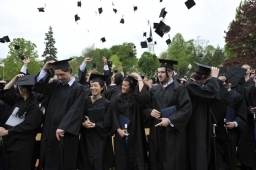Class of 2011 told to find opportunity when least expected
Error message
No matching oEmbed provider found for resource: "http://middmedia.middlebury.edu/media/Communications_LiveRecording-MIDD-web_data-middlebury-edu/mp4/DonovanSeanDickson.mp4"
MIDDLEBURY, Vt.—“It’s not what happens to you. It’s what you do with what happens to you.” This was the message from Chris Waddell ‘91 as he addressed the 593 members of Middlebury’s Class of 2011. With a relaxed smile and the ease of a veteran motivational speaker, Waddell gave the graduating seniors a lot to think about.
“I know that all of you have great plans,” he said, speaking without notes from his wheelchair at the center of the stage. “Some plans are better formed than others, but don’t be bound solely to those plans. Life is fluid. Sometimes when things don’t work out, it’s the greatest gift of all.”
Waddell spoke from experience. As a promising young skier at Middlebury in 1988 he had a skiing accident that left him paralyzed from the waist down. A year later, he was back on the slopes, and two years later was a member of the United States Disabled Ski Team. He went on to become the most decorated male skier in Paralympic history, winning 12 medals over four games, and spending a total of 11 years on the U.S. Disabled Ski Team. He is one of a select few who has medaled in both summer and winter games. In the fall of 2009, Waddell became the first paraplegic to summit Mt. Kilimanjaro unassisted, and in 2010, he was inducted into both the Paralympic Hall of Fame and the U.S. Ski and Snowboard Hall of Fame.
Prior to Waddell’s talk, Donovan Dickson, a mathematics major from Austin, Texas, gave the student speech. Dickson asked his classmates to think about the idea of a “Midd Kidd,” and try to shed the stereotypes common with the term in favor of some of the more meaningful experiences that helped build their identity as Middlebury students.

t 2011 valedictorian matthew pincus” src=”/media/view/276655/small/bjs-20110522-111733-1363.jpg” width=”256” height=”170”>
Dickson told his classmates he was awed by their intelligence, most recently when he attended spring symposium and thesis presentations. But he also stressed the importance of the deep relationships formed over four years. “I realize that that is the whole point of coming to college — to complete an education and prepare ourselves for the next phases of our lives. We did that, and we must be incredibly proud of the work we have put in to get to this point today. But notice that we are not leaving an environment that was obsessed with grades or GPAs. It’s just not something we talk about on a day-to-day basis. Instead we have all been interested in — and there for — each other. Think back to a paper you were stressing out about at some point in your Middlebury career. Say it was due at 5 p.m., you were not nearly as far along as you hoped to be, your day was looking stressful and you ended up having lunch with a friend who made you feel a lot better, even without meaning to. I guarantee you remember that conversation, or at least the friend, much better than even a single word you wrote on that paper.”
Following Dickson’s talk, President Ronald D. Liebowitz asked the audience to observe a moment of silence in memory of three members of the Class of 2011 who had died during their time as students—Pavlo Levkiv, Nicholas Garza and Benjamin Wieler.
Waddell, who was presented the honorary degree, doctor of humane letters, was one of six people to receive honorary degrees at this year’s commencement ceremonies. The others were economics scholar and international adviser to political leaders Padma Desai, doctor of laws; Vermont’s long-serving senator, Patrick Leahy, doctor of laws; local volunteer and activist Dorothy Bigelow Neuberger ‘58, doctor of humane letters; internationally recognized geneticist and director of the Department of Energy’s Joint Genome Institute Edward M. Rubin, doctor of science; and civil rights activist Maxine Atkins Smith, doctor of humane letters, who earned a master’s degree in French from Middlebury in 1950 and won the Freedom Award from the Memphis-based National Civil Rights Museum in 2003.
This year, for the first time, the College created an event during Commencement weekend that gave people a chance to meet informally with the honorary degree recipients. On Saturday afternoon at McCardell-Bicentennial Hall, each of the honorees (with the exception of Senator Leahy, who had a prior commitment) spent more than an hour with seniors and their families, talking about their lives and their work.
During Commencement, in keeping with tradition, President Ronald D. Liebowitz handed out the first diplomas to valedictorian Matthew Pincus, a double major in classics and philosophy from Glen Rock, New Jersey, and salutatorian Stephanie Halgren, a double major in French and psychology from Madison, New Jersey.
The previous day, Pincus and Halgren were honored during the Baccalaureate service in Mead Memorial Chapel, along with quite a few of their classmates. In a new twist to Middlebury’s Baccalaureate, seniors who had received national scholarships and fellowships were introduced to the Mead Chapel crowd. The Baccalaureate address by President Liebowitz, “The Need for Wrong Answers,” followed.
Photos by Brett Simison.

